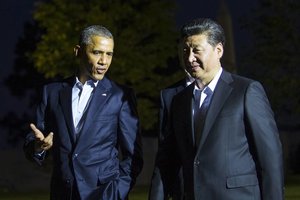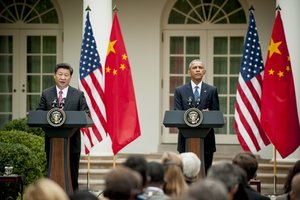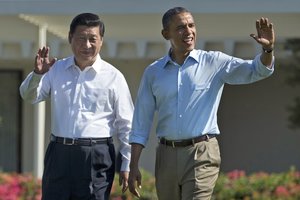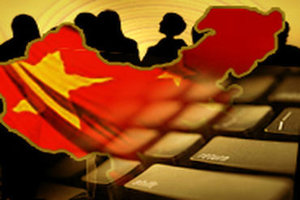China hack attacks on US continue despite commercial spying pact
 A U.S. cybersecurity company says it has evidence hackers linked to the Chinese government may have tried to violate a recent agreement between Washington and Beijing not to hack private firms in each other’s country for economic gain.
A U.S. cybersecurity company says it has evidence hackers linked to the Chinese government may have tried to violate a recent agreement between Washington and Beijing not to hack private firms in each other’s country for economic gain.
The firm plans to announce that unnamed customers in the technology and pharmaceutical industries have faced attempted intrusions from China-linked hackers. Two incidents took place the day before and the day after President Barack Obama and Chinese President Xi Jinping said on Sept. 25 they reached an “understanding” not to use cyberspies to commit economic espionage against each other.
Read moreChinese hackers arrested after US request
 The Chinese government has quietly arrested a handful of hackers at the urging of the U.S. government — an unprecedented step to defuse tensions with Washington at a time when the Obama administration has threatened economic sanctions.
The Chinese government has quietly arrested a handful of hackers at the urging of the U.S. government — an unprecedented step to defuse tensions with Washington at a time when the Obama administration has threatened economic sanctions.
The action came a week or two before President Xi Jinping’s state visit to Washington late last month. The hackers had been identified by U.S. officials as having stolen commercial secrets from U.S. firms to be sold or passed along to Chinese state-run companies. The arrests come amid signs of a potential change in the power balance between the U.S. and Chinese governments on commercial cyberespionage, one of the most fraught issues between the two countries.
Read moreHackers may have stolen the technology behind Samsung Pay
 Months before its technology became the centerpiece of Samsung’s new mobile payment system, LoopPay, a small Massachusetts subsidiary of the South Korean electronics giant, was the target of a sophisticated attack by a group of government-affiliated Chinese hackers.
Months before its technology became the centerpiece of Samsung’s new mobile payment system, LoopPay, a small Massachusetts subsidiary of the South Korean electronics giant, was the target of a sophisticated attack by a group of government-affiliated Chinese hackers.
As early as March, the hackers — alternatively known as the Codoso Group or Sunshock Group by those who track them — had breached the computer network of LoopPay, a start-up in Burlington, Mass., that was acquired by Samsung in February for more than $250 million, according to several people briefed on the still-unfolding investigation, as well as Samsung and LoopPay executives.
Read moreNew iOS malware tricks its way onto iPhones in China and Taiwan
 A new species of malware that shows fullscreen ads is flourishing on Apple devices in China and Taiwan. The development follows reports last month that apps loaded with malware had to be purged from the company's App Store.
A new species of malware that shows fullscreen ads is flourishing on Apple devices in China and Taiwan. The development follows reports last month that apps loaded with malware had to be purged from the company's App Store.
The malicious software, dubbed YiSpecter, is reportedly able to install and launch arbitrary iOS apps, replace existing apps with those it downloads, hijack other apps' execution to display advertisements, change Safari's default search engine, bookmarks and opened pages, and upload device information. In China, QVOD was popular for its ability to allow users to share pornographic content.
Read moreHacked Uber accounts are now being used in China
 Uber is off to a rocky start in China. The company threatened to punish any of its drivers that took part in protests against the taxi app, a large number of trips in the country are false trips concocted by drivers looking to make some easy yuan on Uber's dime.
Uber is off to a rocky start in China. The company threatened to punish any of its drivers that took part in protests against the taxi app, a large number of trips in the country are false trips concocted by drivers looking to make some easy yuan on Uber's dime.
Now, it looks like Chinese fraudsters are using hacked Uber accounts to take free trips. In May, thousands of Uber accounts were for sale on the dark web, for as little as $1 each. In August, the price of hacked accounts dropped to just 40 cents. Those accounts were accessed by hackers because Uber customers had used the same password in their taxi app as one for another service.
Read moreUS developing sanctions against China over cyberthefts
 The Obama administration is developing a package of unprecedented economic sanctions against Chinese companies and individuals who have benefited from their government’s cybertheft of valuable U.S. trade secrets.
The Obama administration is developing a package of unprecedented economic sanctions against Chinese companies and individuals who have benefited from their government’s cybertheft of valuable U.S. trade secrets.
The U.S. government has not yet decided whether to issue these sanctions, but a final call is expected soon — perhaps even within the next two weeks, according to several administration officials, who spoke on the condition of anonymity to discuss internal deliberations. Issuing sanctions would represent a significant expansion in the administration’s public response to the rising wave of cyber-economic espionage initiated by Chinese hackers.
Read moreRussia, US able to take joint diplomatic efforts
 Relations between Russia and the United States are not hopeless, and the two countries can undertake various joint diplomatic efforts, Andrei Krutskikh, Russian Foreign Ministry’s ambassador-at-large and presidential special envoy in international cooperation in information security, said.
Relations between Russia and the United States are not hopeless, and the two countries can undertake various joint diplomatic efforts, Andrei Krutskikh, Russian Foreign Ministry’s ambassador-at-large and presidential special envoy in international cooperation in information security, said.
The UN’s Group of Governmental Experts submitted a report presenting the rules of the road in cyberspace that all nations should respect, emphasizing that the countries should not intentionally damage each other’s infrastructure with cyber-attacks. Representatives from 20 countries were involved in the preparation of the report.
Read moreChina read emails of top US officials
 China's cyber spies have accessed the private emails of "many" top Obama administration officials, according to a senior U.S. intelligence official and a top secret document obtained, and have been doing so since at least April 2010.
China's cyber spies have accessed the private emails of "many" top Obama administration officials, according to a senior U.S. intelligence official and a top secret document obtained, and have been doing so since at least April 2010.
The email grab was detected in April 2010, according to a top secret NSA briefing from 2014. The intrusion into personal emails was still active at the time of the briefing and, according to the senior official, is still going on. In 2011, Google disclosed that the private gmail accounts of some U.S. officials had been compromised, but the briefing shows that private email accounts from other providers were compromised as well.
Read moreChinese hackers target American Airlines
 A group of China-linked hackers that has mowed through the databanks of major American health insurers and stolen personnel records of U.S. military and intelligence agencies has struck at the heart of the nation’s air-travel system.
A group of China-linked hackers that has mowed through the databanks of major American health insurers and stolen personnel records of U.S. military and intelligence agencies has struck at the heart of the nation’s air-travel system.
Sabre Corp., which processes reservations for hundreds of airlines and thousands of hotels, confirmed that its systems were breached recently, while American Airlines Group Inc., the world’s biggest carrier, said it is investigating whether hackers had entered its computers. Both companies were hacked as part of the same wave of attacks that targeted insurer Anthem Inc. and the U.S. government’s personnel office.
Read moreChina leading suspect in US cyberattack, says intelligence chief
 Chinese hackers were behind the recent cyberattack that compromised the records of millions of government workers, at least according to a top US intelligence official.
Chinese hackers were behind the recent cyberattack that compromised the records of millions of government workers, at least according to a top US intelligence official.
Director of National Intelligence James Clapper said that China is the leading suspect in a security attack against the government's personnel office, the first time a US officially has publicly pointed the finger at the Chinese government. The attack not only accessed the records of government workers in the Office of Personnel Management but may have compromised 18 million Social Security numbers of US citizens.
Read moreAxarhöfði 14,
110 Reykjavik, Iceland















